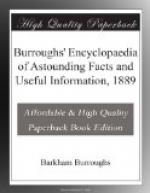On the average, men have their first-born at 30 and women at 28. The greatest number of deliveries take place between 25 and 35. The greatest number of deliveries take place in the winter months, and in February, and the smallest in July, i.e., to February, as 4 to 5 in towns and 3 to 4 in the country. The night births are to the day as 5 to 4.
Human Strength.—In Schulze’s experiments on human strength, he found that men of five feet, weighing 126 lbs., could lift vertically 156 lbs. 8 inches; 217 lbs. 1.2 inches. Others, 6.1 feet, weighing 183 lbs., 156 lbs. 13 inches, and 217 lbs. 6 inches; others 6 feet 3 inches, weighing 158 lbs., 156 lbs. 16 inches, and 217 lbs. 9 inches. By a great variety of experiments he determined the mean human strength at 30 lbs., with a velocity of 2.5 feet per second; or it is equal to the raising half a hogshead 10 feet in a minute.
RULES FOR SPELLING.
Words ending in e drop that letter before the termination able, as in move, movable; unless ending in ce or ge, when it is retained, as in change, changeable, etc.
Words of one syllable, ending in a consonant, with a single vowel before it, double the consonants in derivatives; as, ship, shipping, etc. But if ending in a consonant with a double vowel before it, they do not double the consonant in derivatives; as, troop, trooper, etc.
Words of more than one syllable, ending in a consonant preceded by a single vowel, and accented on the last syllable, double that consonant in derivatives; as, commit, committed; but except chagrin, chagrined.
All words of one syllable ending in l, with a single vowel before it, have ll at the close; as mill, sell. All words of one syllable ending in l, with a double vowel before it, have only one l at the close; as mail, sail.
The words foretell, distill, instill and fulfill, retain the ll of their primitives. Derivatives of dull, skill, will and full also retain the ll when the accent falls on these words; as dullness, skillfull, willfull, fullness.
Words of more than one syllable ending in l have only one l at the close; as delightful, faithful; unless the accent falls on the last syllable; as befall, etc.
Words ending in l, double the letter in the termination ly.
Participles ending in ing, from verbs ending in e, lose the final e; as have, having; make, making, etc; but verbs ending in ee retain both; as see, seeing. The word dye, to color, however, must retain the e before ing. All verbs ending in ly, and nouns ending in ment, retain the e final of the primitives; as brave, bravely; refine, refinement; except words ending in dge; as, acknowledge, acknowledgment.




